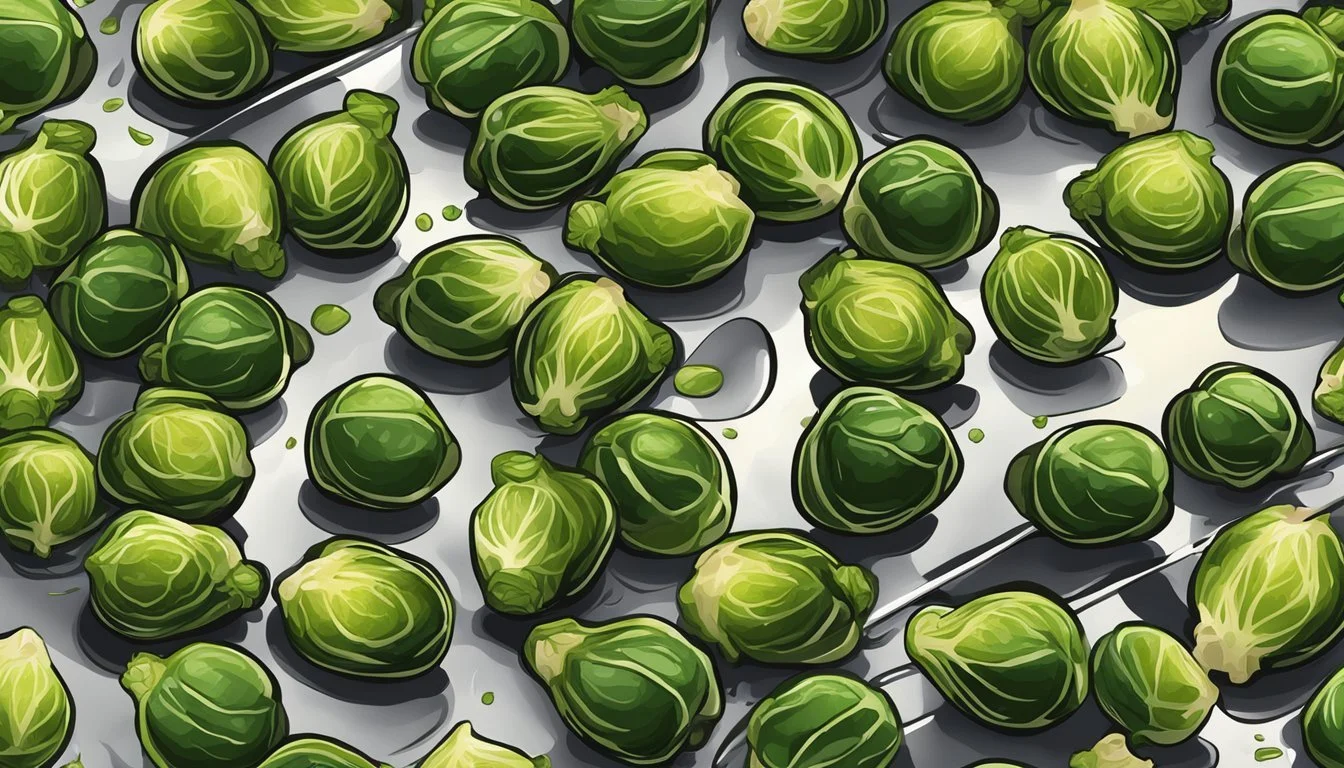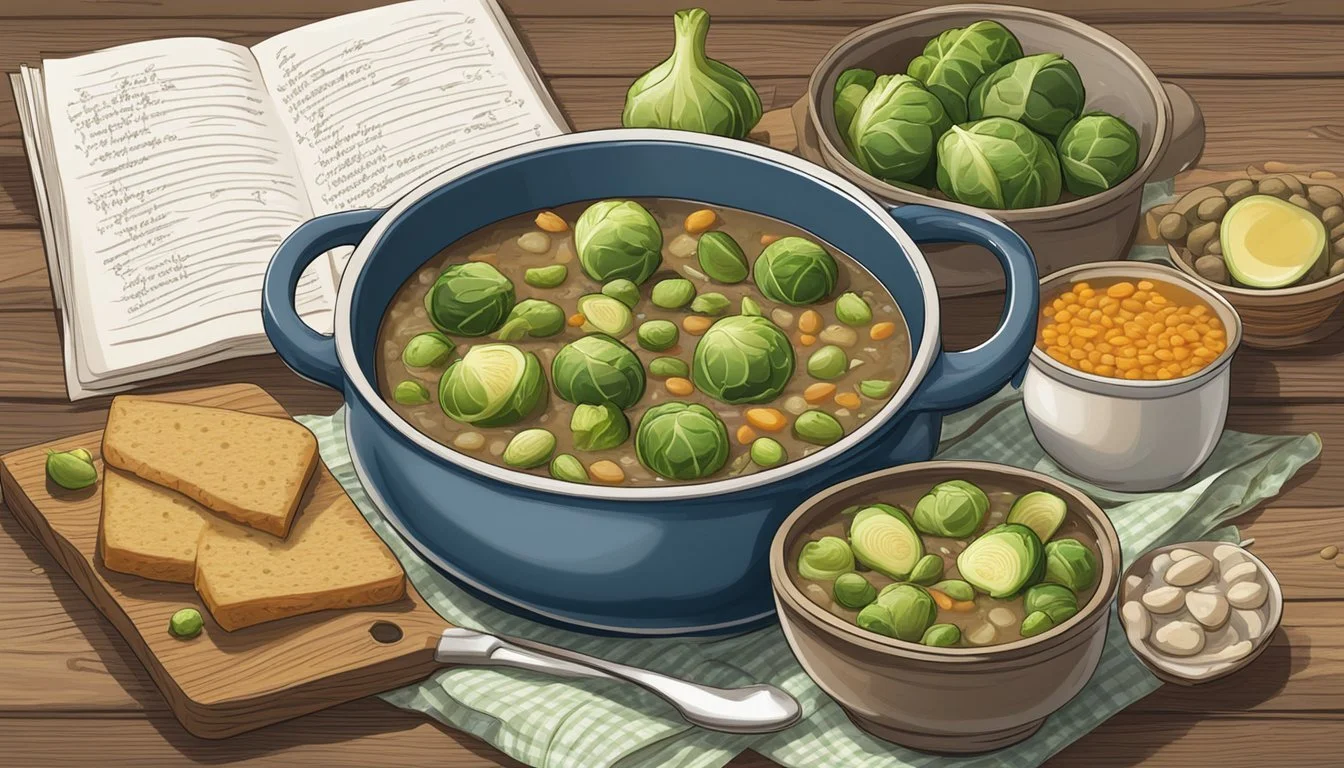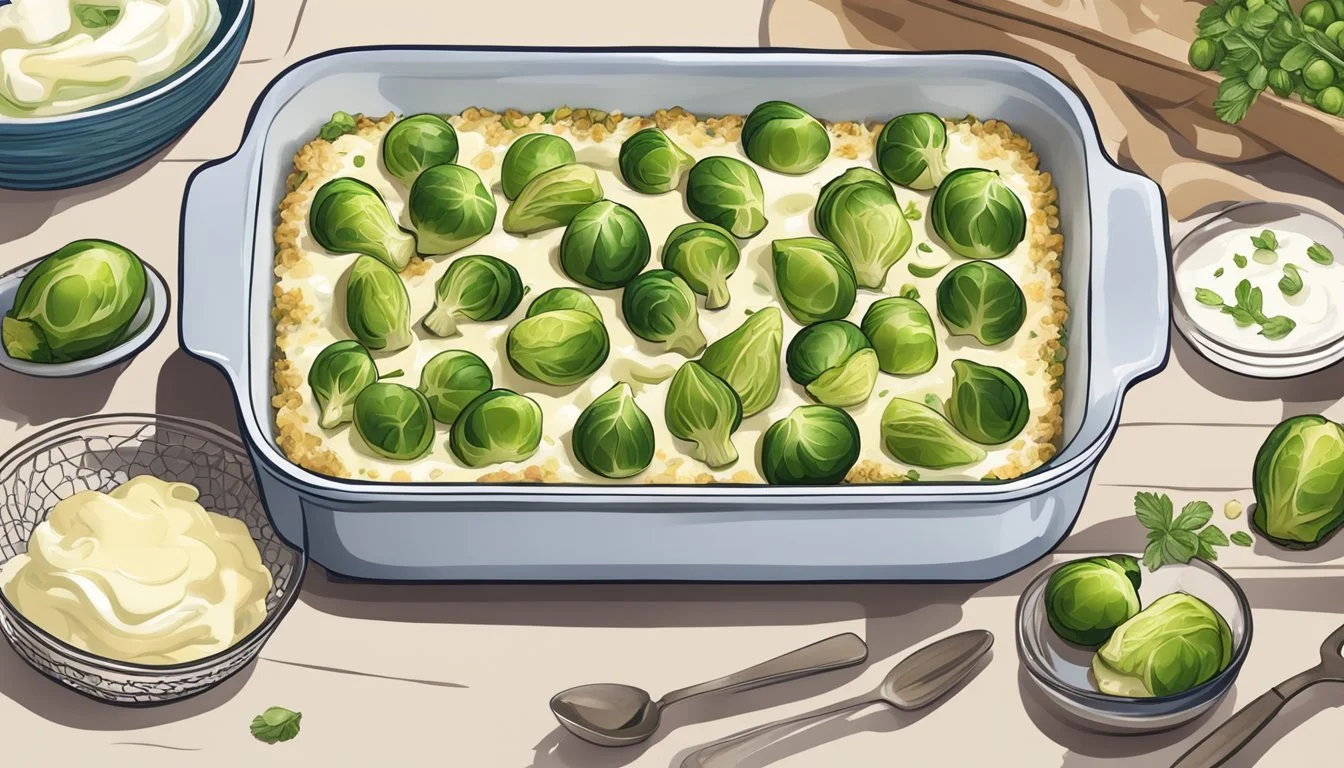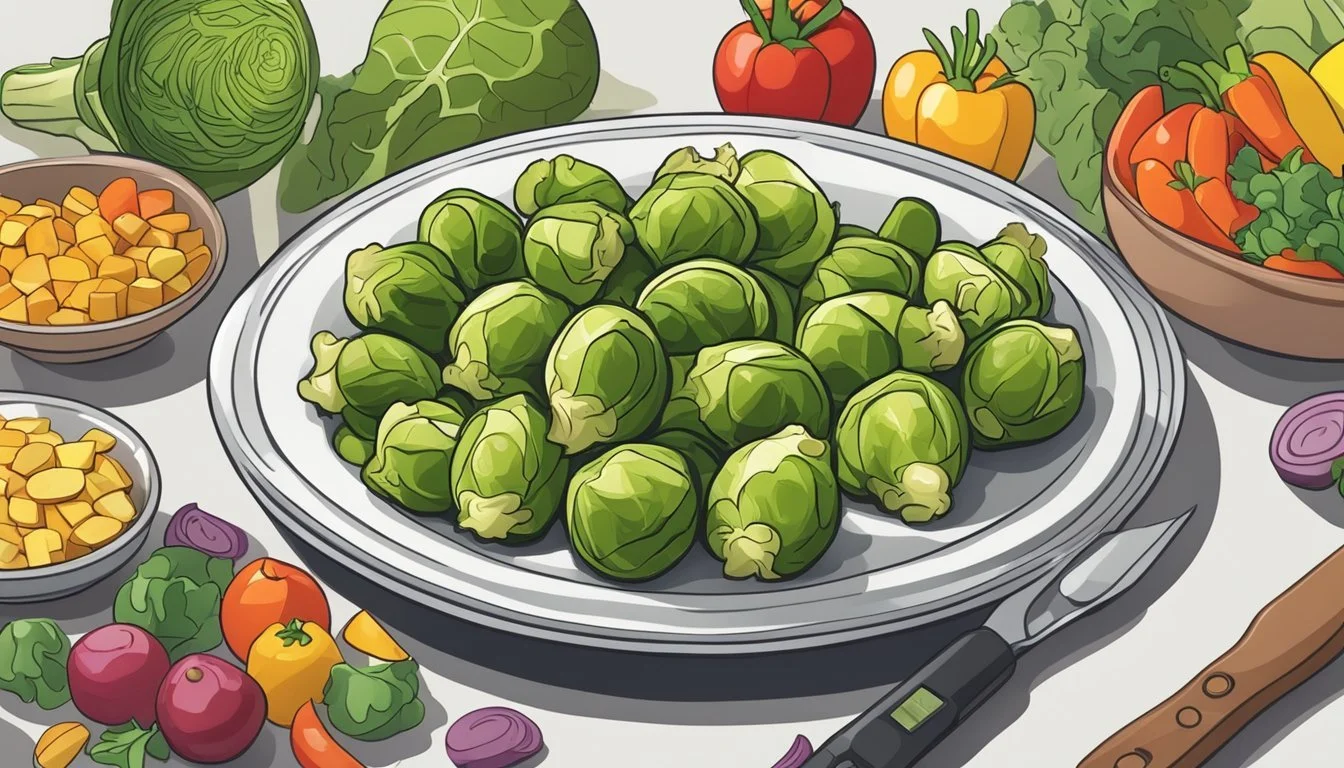11 Diabetes-Friendly Recipes Using Brussels Sprouts
Delicious and Nutritious Meals
Brussels sprouts are a nutritious and versatile vegetable that can be a delightful addition to any diabetic meal plan. Packed with essential vitamins like Vitamin C and Vitamin K, they offer numerous health benefits while being low in calories and carbs. Discover how these tiny greens can elevate your meals with delicious, diabetes-friendly recipes.
In this article, readers will find a variety of ways to prepare Brussels sprouts that cater specifically to the dietary needs of those managing diabetes. From roasting to stir-frying, these recipes are designed to be both tasty and health-conscious. Enjoy the flavors and nutritional advantages of Brussels sprouts with these easy-to-follow dishes.
1) Brussels Sprouts and Quinoa Salad
Brussels sprouts and quinoa make a nutritious and diabetes-friendly combination. Start by cooking the quinoa. Bring 2 cups of water to a boil, add 1 cup of quinoa, reduce the heat, cover, and simmer for about 12-15 minutes until the water is absorbed. Fluff the quinoa with a fork and let it cool.
While the quinoa is cooking, prepare the Brussels sprouts. Preheat the oven to 400°F. Wash the Brussels sprouts thoroughly, trim off the ends, and cut them in half. Toss them with olive oil, salt, and pepper. Spread the Brussels sprouts on a baking sheet and roast them for 25-30 minutes until they’re tender and slightly browned.
Once the Brussels sprouts are roasted and the quinoa is cooked, combine them in a large bowl. Add some toasted pecans and dried cranberries for extra texture and flavor. Pour a light vinaigrette over the mixture and gently toss to combine. Serve the salad warm or chilled, depending on your preference. Store any leftovers in an airtight container in the fridge for up to three days.
2) Roasted Brussels Sprouts with Balsamic Glaze
Roasted Brussels sprouts with balsamic glaze offer a flavorful side dish perfect for those managing diabetes. These sprouts, when roasted, develop a nutty and slightly sweet taste that complements the tangy balsamic glaze.
Start by trimming and halving the Brussels sprouts. Toss them in olive oil, salt, and pepper. Roast the sprouts at 400°F for about 20-25 minutes until they are crispy and golden brown.
While the sprouts are roasting, prepare the balsamic glaze. Simmer balsamic vinegar until it reduces by half and thickens into a syrupy consistency. A touch of honey can be added to the glaze if desired.
Once the Brussels sprouts are done, drizzle the balsamic glaze over them. The combination of the roasted sprouts with the rich, tangy glaze creates a dish that is both healthy and packed with flavor.
This recipe is not only simple to prepare but also provides a healthy option for those looking to incorporate more vegetables into their diet.
3) Brussels Sprouts and Chicken Stir-Fry
Brussels sprouts and chicken stir-fry is a delicious and diabetes-friendly meal. It combines lean protein with nutrient-rich vegetables. Start by washing and halving the Brussels sprouts, and slicing the chicken into bite-sized pieces.
Heat a large skillet or wok over medium-high heat. Add a small amount of vegetable oil to the pan. Once hot, add the Brussels sprouts, cut side down, and cook until browned.
Next, add the sliced chicken and minced garlic. Stir regularly to ensure even cooking. Continue to cook until the chicken is fully cooked and the Brussels sprouts are tender.
Season the stir-fry with salt, pepper, and your choice of low-sodium soy sauce or other diabetes-friendly seasoning. Serve hot and enjoy a balanced, healthy meal.
This dish is versatile and can be paired with brown rice or quinoa for added fiber. Feel free to experiment with additional vegetables like bell peppers or snap peas. This makes for a wholesome and satisfying dinner option.
4) Brussels Sprouts and Sweet Potato Hash
Brussels Sprouts and Sweet Potato Hash is a nutritious and flavorful dish that is perfect for individuals with diabetes. This dish combines the earthy taste of Brussels sprouts with the natural sweetness of sweet potatoes.
The preparation starts by preheating the oven to around 400°F to 450°F. Sweet potatoes and Brussels sprouts are cut into bite-sized pieces and laid out on a lined baking sheet.
A light drizzle of olive oil, along with seasonings such as salt and pepper, adds flavor while keeping things simple. To ensure even cooking, toss the vegetables halfway through the baking time.
This hash can be further enhanced with additional vegetables like diced onions and red bell peppers. Their added flavors complement the main ingredients without overpowering them.
After about 20-30 minutes in the oven, the vegetables should be tender inside and slightly crispy on the outside. This dish serves as an excellent side or even a main course when paired with a lean protein.
It’s both hearty and healthy, making it an ideal choice for anyone looking to maintain balanced blood sugar levels without sacrificing taste.
5) Brussels Sprouts and Lentil Soup
Brussels Sprouts and Lentil Soup is a hearty and nutritious option for those with diabetes.
To start, soak lentils for about three hours. Cook them in water over medium heat for 25-30 minutes until tender.
Meanwhile, clean and halve Brussels sprouts. Add chopped onions and garlic to a pot and sauté for a few minutes until soft.
Next, add the Brussels sprouts and cook briefly. Combine the lentils, Brussels sprouts, and seasoned broth in the pot.
Bring to a boil, then simmer for five minutes. This soup pairs well with a slice of whole-grain bread, making for a satisfying meal.
6) Brussels Sprouts and Bacon Skewers
Brussels sprouts and bacon skewers create a perfect balance of flavors and textures. They combine the earthy taste of roasted Brussels sprouts with the savory crunch of bacon.
To prepare, halve the Brussels sprouts and toss with salt and pepper. Add some bacon fat to ensure extra flavor and even cooking.
Thread the bacon and halved Brussels sprouts alternately onto skewers. Place them on a baking sheet lined with parchment paper. Roast in the oven at high temperature for about 30 minutes until the Brussels sprouts are golden brown and the bacon is crispy.
This simple, delicious dish makes a great side for any meal. It suits anyone looking for a diabetes-friendly option without compromising on taste.
7) Brussels Sprouts and Walnut Pesto Pasta
This dish features a delightful combination of Brussels sprouts and walnut pesto, making it both nutritious and delicious.
To prepare, begin by roasting Brussels sprouts in the oven until they are tender and slightly browned. Combine the roasted sprouts with whole grain pasta for added fiber and nutrients.
For the walnut pesto, blend fresh basil, walnuts, olive oil, garlic, and a pinch of salt and pepper until smooth. Stir this flavorful pesto into the pasta, ensuring each piece is well-coated.
Walnuts add a crunchy texture and healthy fats, making this meal heart-friendly. The mix of Brussels sprouts and whole grains supports stable blood sugar levels, ideal for a diabetes-friendly diet.
Serve the pasta warm, garnished with a sprinkle of Parmesan cheese if desired. This recipe balances flavors and health benefits, perfect for a satisfying dinner.
8) Brussels Sprouts and Tofu Sauté
This dish combines the nutty flavor of Brussels sprouts with the savory taste of tofu, making it both hearty and satisfying.
Start by cutting Brussels sprouts in half. Then press and cube the tofu.
Boil the Brussels sprouts for 3 minutes, then drain and dry them.
In a skillet, heat olive oil over medium-high heat and add the tofu. Cook until it is golden and crispy on all sides.
Remove the tofu and add more oil if necessary.
Sauté the Brussels sprouts, cut side down, until they are golden brown. This should take about 5-7 minutes.
For added flavor, toss the tofu back in and drizzle with soy sauce or tamari. Mix thoroughly.
Finish by adding a sprinkle of sea salt and cracked black pepper. Serve warm.
9) Brussels Sprouts Gratin with Greek Yogurt
Brussels Sprouts Gratin with Greek Yogurt offers a lighter twist on a classic dish. This recipe maintains the comforting flavors of a gratin while reducing the fat content by substituting Greek yogurt for heavy cream.
To prepare, steam or microwave Brussels sprouts until they are tender. Once cooked, place them in a broiler-safe baking dish.
In a separate bowl, mix Greek yogurt with salt, pepper, and a touch of garlic powder. Pour the yogurt mixture over the Brussels sprouts, ensuring they are well-coated.
For added texture, sprinkle a blend of whole wheat breadcrumbs and a small amount of Parmesan cheese on top. This will create a golden, crispy topping when broiled.
Preheat the broiler and place the dish under it for several minutes. Watch closely until the topping turns golden brown. This method keeps the dish light yet flavorful.
This gratin pairs well with lean proteins or can be enjoyed as a standalone vegetarian dish.
10) Brussels Sprouts and Apple Slaw
Brussels Sprouts and Apple Slaw offers a fresh, crisp addition to any meal. This slaw combines the slight bitterness of Brussels sprouts with the sweet-tart flavor of apples for a balanced dish.
Start by thinly slicing Brussels sprouts using a mandoline or sharp knife. Then, peel and core fresh apples, slicing them into thin strips. This combination of textures makes each bite interesting.
For added crunch, include chopped pecans or walnuts. A small roasting time of about 10 minutes at 350° F can enhance their flavor. Slice some green onions finely to add a mild, tangy taste.
The dressing ties everything together. A mix of apple cider vinegar, maple syrup, Dijon mustard, and olive oil works beautifully. Whisk these ingredients until smooth, then toss with the slaw ingredients.
This recipe can be prepared ahead and stored in the refrigerator. It can be served immediately or chilled for later. Ideal for those with diabetes, it offers a nutritious option without sacrificing flavor.
11) Brussels Sprouts and Mushroom Risotto
Brussels sprouts and mushroom risotto offer a delicious and diabetes-friendly meal option. The combination of earthy mushrooms and roasted Brussels sprouts creates a flavorful dish that's both nutritious and satisfying.
To start, preheat the oven to 500°F to roast the Brussels sprouts. Halve the sprouts and toss them in olive oil, salt, and pepper. Roast them until they are golden brown.
While the Brussels sprouts are roasting, heat a medium saucepan with chicken broth and water to a simmer. Keep it warm over low heat.
In a large pot, melt butter over medium heat and sauté chopped onions and mushrooms with a pinch of kosher salt. Cook until the onions are translucent, and the mushrooms are tender.
Add Arborio rice to the pot, stirring to coat the grains in the butter. Begin to ladle the warm broth into the rice mixture, one ladle at a time, stirring constantly. Continue this process until the rice is creamy and cooked through.
Finally, gently fold in the roasted Brussels sprouts. Season the risotto with additional salt and pepper to taste, and garnish with freshly grated Parmesan cheese if desired.
Serve hot and enjoy a rich, comforting dish that's suitable for a diabetes-friendly diet.
Nutritional Benefits of Brussels Sprouts
Brussels sprouts offer numerous health benefits, especially for those managing diabetes. Their high fiber content aids in digestive health and blood sugar control, while their richness in vitamins and minerals supports overall well-being.
High Fiber Content
Brussels sprouts are notably high in dietary fiber, containing about 3 grams per cup. This fiber is essential for maintaining healthy digestion and can help regulate blood sugar levels by slowing the absorption of sugar into the bloodstream.
Fiber also promotes satiety, helping individuals feel full longer, which can be beneficial for weight management. The fiber in Brussels sprouts is mainly soluble, which aids in reducing bad cholesterol (LDL) levels and supports heart health.
Regular consumption of Brussels sprouts can thus support a diabetic-friendly diet by helping to keep blood sugar levels stable and improve digestive health.
Rich in Vitamins and Minerals
Brussels sprouts are packed with essential vitamins and minerals. One cup provides more than the recommended daily amount of Vitamin C, which supports immune function and helps the body fight infections. They are also rich in Vitamin K, crucial for blood clotting and bone health.
Additionally, Brussels sprouts contain significant amounts of folate and potassium. Folate is important for cell function and tissue growth, while potassium helps maintain proper heart and muscle function.
These nutrients work together to promote overall health, making Brussels sprouts a valuable addition to a diabetic diet.
Brussels Sprouts and Blood Sugar Control
Brussels sprouts offer significant benefits for blood sugar control. Their low glycemic index and antioxidant properties make them an excellent choice for individuals managing diabetes.
Low Glycemic Index
Brussels sprouts are low on the glycemic index, which means they have a minimal impact on blood sugar levels. This is crucial for diabetics, as it helps in maintaining stable glucose levels.
One cup of Brussels sprouts contains about 8 grams of carbs, with 3 grams of dietary fiber. The fiber slows down the absorption of sugar into the bloodstream, preventing spikes in blood sugar. This makes it easier to manage insulin levels and reduces hunger, which can help with weight management.
Antioxidant Properties
Brussels sprouts are rich in antioxidants, specifically vitamins C and K. These antioxidants help combat oxidative stress, which is often higher in individuals with diabetes.
Oxidative stress can lead to inflammation and insulin resistance. Including Brussels sprouts in the diet can mitigate these issues. In addition to vitamins, Brussels sprouts also contain other beneficial compounds like sulforaphane, which has been shown to have anti-inflammatory and immune-boosting properties.
Adding Brussels sprouts to meals can be a tasty way to support overall health and maintain optimal blood sugar levels.
Incorporating Brussels Sprouts into a Diabetes-Friendly Diet
Brussels sprouts are a nutritious vegetable with a low glycemic index that can help manage blood sugar levels. They can be combined with other low-GI vegetables and lean proteins to create balanced meals.
Meal Planning Tips
When incorporating Brussels sprouts into meals, choose complementary low-glycemic vegetables such as broccoli, cauliflower, kale, and spinach. These vegetables support steady blood sugar levels and add variety.
Create balanced meals by including lean proteins like chicken, fish, or tofu alongside whole grains such as quinoa or brown rice. This balance ensures a slow release of glucose into the bloodstream.
Use portion control to manage carbohydrate intake and prevent blood sugar spikes. Aim for half of the plate filled with non-starchy vegetables, a quarter with lean protein, and a quarter with whole grains.
Cooking Methods for Maximum Flavor and Nutrition
Roasting Brussels sprouts enhances their natural sweetness while retaining nutrients. Toss them with a small amount of olive oil, salt, and pepper, then roast until caramelized.
Steaming is another excellent method that preserves vitamins and minerals. Steamed Brussels sprouts can be seasoned with lemon juice or herbs for added flavor.
Sautéing Brussels sprouts with garlic and other spices can provide a quick and tasty option. Use a non-stick pan and minimal oil to keep the dish low in fat.
By choosing these cooking methods, you can maximize both the flavor and nutritional benefits of Brussels sprouts, making them a key part of a diabetes-friendly diet.














